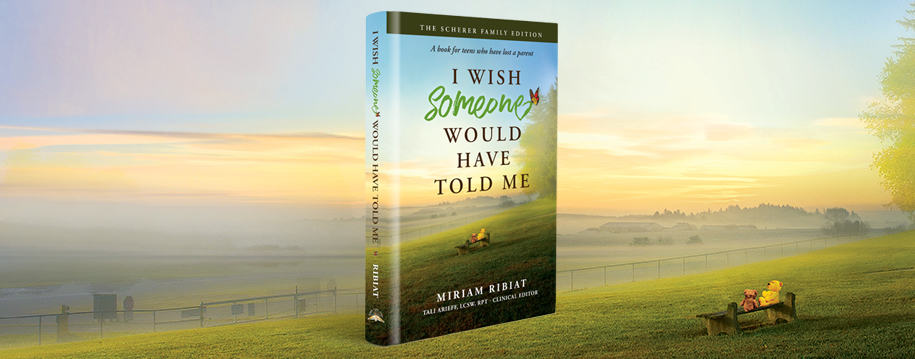
Reprinted with permission from Links magazine by Shaindy Perl
Meet the Author of I Wish Someone Would Have Told Me
Miriam Ribiat’s book, I Wish Someone Would Have Told Me, has received enthusiastic feedback from readers. In this interview, she shares her background and how she came to write this book.
Can you tell us a little bit about yourself and your experience with loss?
I live in Lakewood today, but I grew up in Detroit, the second of five children. Ours was a very happy home, with four girls and one boy. When I was twenty, my brother was diagnosed with leukemia. He passed away at the age of fourteen, during my first year back from seminary.
I dealt with that loss in a very logical way and didn’t let my emotions overtake me. In truth, I didn’t know what to do with my emotions. I focused more on my parents’ pain since they had lost their only son and youngest child. I remember thinking then that many people experience challenges, and now I knew that this would be mine.
My older sister was twenty-three at the time, and was planning to move to New York. She left as scheduled only a day after the shivah was finished. It was hard to see how much quieter our house suddenly became, but we still tried to have a happy home.
I became engaged one year later, right around the time of my brother’s first yartzeit. Though my older sister was still single, it was nice to have a family simchah and celebrate together. The chasunah was soon followed by more simchos, as my older children were born in the years that followed.
Tragically, the joyous times were disrupted when both my older sister and my mother were diagnosed with cancer within several days of each other. From the start, neither received a positive prognosis. Nonetheless, both were able to keep moving forward initially, even while they were fighting their disease. In fact, my older sister became engaged and got married after her diagnosis. Her husband was informed of her condition while they were still dating, but he was determined to marry her anyway and spend whatever time she had together.
And more loss
Our family was dealing with the stress of knowing that my mother and sister were both fighting for their lives. Very suddenly, my father suffered a fatal heart attack in 2009 during a relative’s wedding. This was a complete shock to all of us since he had been completely healthy. We simply didn’t know how to make sense of the tragedy. During the shivah, I remember looking worriedly at my sister, who wasn’t doing well at all. I don’t know how it will happen, but surely she’ll get better! I told myself. Hashem can’t take her too!
Sadly, my sister died eight months later. My mother couldn’t even grieve properly for her, since she was too busy fighting for her own life. She had had a very good marriage, and it was heartbreaking to see how lonely she was as she went through her own medical journey. Although she was a strong, independent person, my father had been her rock and support. She passed away a year and a half later, in 2011.
It’s hard to describe the period of time that followed. Living with a big empty hole inside me and with all-consuming pain, I couldn’t hear anyone complain about anything. I couldn’t accept any sympathy that came my way. I put my pain on a pedestal, thinking that no one’s pain could possibly compare to mine. As such, nothing they experienced could compare and nothing they said meant anything, since they couldn’t possibly understand what I was going through.
Fortunately, I am blessed with some very close friends. They were really there for me. One was open enough to point out that I was pushing away people who only wanted to support me. After deep, intellectual conversations I eventually began to understood that other people’s pain also deserved my sympathy and compassion. I can be more attuned to people’s struggles now, even if their challenges are different from mine. Additionally, I learned to accept the help and support that people give me. By being more open to others, I was able to begin healing.
How did you become connected with Chevrah Lomdei Mishnah?
I had been teaching for some time, but after all the losses, I had no emotional energy left. Traumatized, I felt that I simply couldn’t teach anymore.
I took a break for a year and a half. When I felt ready to rejoin the workforce, I still couldn’t think of anything having to do with a classroom. I scanned the ads for a job and saw one from Chevrah Lomdei Mishnah that required a commitment of nine hours a week with the ability to work from home. I liked the flexibility and the fact that the job involved data entry — unemotional mindless work, which was all I wanted to do at that point.
Originally, the organization focused on finding people to learn mishnayos for aveilim who wanted the zechus for a niftar but couldn’t do it on their own. It eventually expanded to helping people deal with grief and to offering resources like a Yizkor guide and a pamphlet with chapters of Tehillim that are said at a cemetery. As the organization grew, new opportunities came up for me. I grew together with the organization and took on different roles. With time, I also started writing a lot for the organization’s blog on the topic of grief. Today, I continue writing regularly while also working as a project manager.
As the author, how did you come up with the idea for the book? What did you hope to accomplish with it?
My boss suggested the idea of writing a book for teens who are growing up without a parent. We began thinking about different people who could write it, and somehow we decided that maybe I’d give it a try. At first, I was a bit hesitant, because my experience is not the same as those who are growing up without a parent. However, even if the situation is different, I figured I would be able to put myself in these teens’ shoes.
I interviewed many people: boys and girls, as well as adults who lost a parent as a child. I started off by knowing a few of the topics I wanted to explore. As I conducted interviews, people kept bringing up new topics; many of the ideas ultimately came from the interviewees themselves. I often heard the same topic from several people and was able to include different experiences and outlooks. Therapists later reviewed the manuscript, as did Sarah Rivkah Kohn, the founder of Links (an organization that supports young girls and teens who have lost a parent) to make sure that we presented everything correctly.
The book is intended not only for those who lost a parent, but also for parents, teachers, relatives, and friends. I hope it’s a book that people will feel comfortable giving to others. We called the book I Wish Someone Would Have Told Me because we didn’t want anything about the cover to scream that someone is a nebach case. It’s a very comfortable book to look at.
Anyone Can Learn From it
In fact, there are things in the book that any person can learn from, whether they went through a loss or not. It discusses jealousy, for example, and how we learn from a young age that just as we shouldn’t envy someone with poor eyesight who has eyeglasses because that person obviously needs them while we do not, we shouldn’t envy anything else.
Then if someone’s mother dies and they are jealous of their friends who don’t have to deal with this situation, that person can think, “I’m a terrible person! Why do I feel jealous?” However, if we stop fighting the feeling, if we learn to accept it, we can work through it. A discussion such as this one is relevant for anyone who might be envious of someone who has a nicer husband, a better marriage, more kids, easier kids, more money, or anything else. It’s a discussion many people can benefit from.
Ultimately, I hope this book will allow kids in this situation to feel normal. Whatever they feel is normal. If a girl is standing with her sister and someone comes over and says, “I remember your mother. She was so great!” and afterward she politely thanks the person while her sister bursts into tears, that is normal! Both reactions are normal. If someone go back to school and feels he can’t connect with his friends anymore because his life changed so much, that’s normal. If a teen suddenly needs to spend more time with her friends, whether to escape the pain or get support, that’s also normal. I think that’s a huge struggle that people have, where they think they’re crazy, and the only ones who feel this way. In reality, there can be so many reactions, and they’re all normal.
Do you have any final messages for our readers?
The reason I wrote this book was to help those who need it. During the process, I was very inspired by many people I spoke to. For instance, I discovered that there are people walking around who look so regular, but many of them are carrying huge burdens. I found them to be very inspirational.
I’ve spent a long time on the book, close to three years. I sincerely hope that people gain from it, that the book will benefit and help them. And as much as I want people to benefit from the book, I really hope that very soon this book will not be needed anymore.














